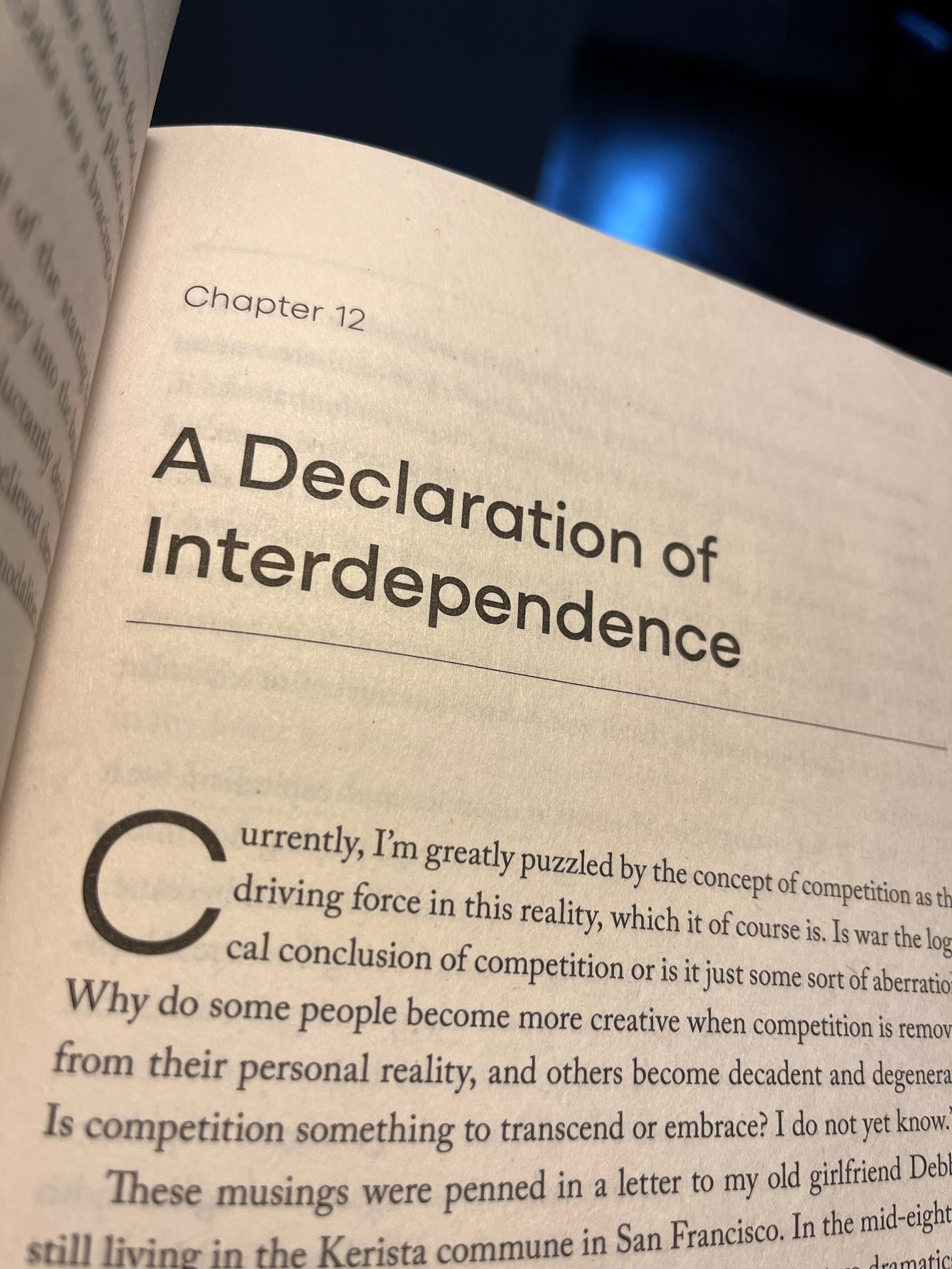John Mackey's Declaration of Interdependence
Part Three of My Discussion of John Mackey's Autobiography, The Whole Story: Adventures in Love, Life and Capitalism
Why is Whole Foods Market staffed mostly by progressives?1
Is it because Whole Foods is located in cities where progressives live?
Is it because progressives are more likely to be vegetarian and vegan?
Is it because progressives value health food more than non-progressives?
Or does it have something to do with signaling upper class status, i.e. luxury beliefs? Maybe that pesticides like DDT could cause cancer and harm animals? That fair trade is better than free trade? That animal welfare should be prioritized over other considerations?
How would we come to know the answers to these questions? And why might we want to know the answers to these questions?
As someone who isn’t progressive, but shops at Whole Foods, I’d like to know.
Is there something about John Mackey’s philosophy that attracts progressives? Let’s explore.
John Mackey writes,
Some days, the camaraderie among the team at Whole Foods Market felt intoxicating—everyone playing a choreographed role, moving through the stores like dancers in a chaotic but beautiful ballet of form and function. If ever there was an experience that made me believe in the power of cooperation, that was it. I loved the community and creative energy that we generated together. And yet, I was also acutely aware of how being an entrepreneur had channeled my own competitive instincts. I thrived on competition, loved to excel in sports and in business. I was driven to outdo our competitors, to win in the marketplace. The competitive drive was critical to our success, and my readings convinced me that it was essential to the entire capitalist enterprise.
I love that juxtaposition. Mackey is trying to reconcile the mysteries and trade-offs between cooperation and competition. This is an ongoing debate in politics, economics, etc. How much competition is too much? How can competition be generative?
We can imagine a team of Whole Foods employees as being like a tribe. Within the tribe is a culture of cooperation working toward a common goal. Employees want to satisfy expectation norms. They feel a sense of esteem knowing they have done good for the team.
They also just want to get paid.
For Mackey the progressive staff of Whole Foods gave him trouble. In Chapter 12 he explains his philosophy regarding competition and cooperation.
I found it fascinating to read about economics and capitalism writ large, and then to reflect on how those processes were playing out in our still-young company. I was amazed at how a good idea could become a store, and a successful store could become several, turning into a real business, and a real business could grow to become a large company. And that chain of success could potentially change an entire industry. Of course, none of this would have been possible without a large degree of political and economic freedom—as [Milton] Friedman pointed out again and again in his books. Safer Way could never have gotten started if Renee and I had not lived in a place where we had the freedom to start a new business. Thankfully, the barriers to entry were pretty minimal. "Wherever you have freedom, you have capitalism," Friedman wrote, and I could see the truth in his words.
Wherever you have freedom, you have capitalism. What is capitalism? I like Makey’s description. It’s a simple, non-Marxist perspective, based on evolution.2
Capitalism, I began to understand, was not so much a top-down imposed system but, rather, an evolutionary result of letting people choose their own economic paths. And if economic freedom was the foundation of capitalism, then both cooperation and competition seemed to be the essential engines that made it run.
This is part of his “Declaration of Interdependence.” I find that explanation rather profound. It reminds me of Matt Ridley’s book The Rational Optimist. The perspective here is that capitalism existed before government and before Marxism; it emerged alongside us as part of our culture as we evolved from hunter-gatherers into who we are today.
And with this final passage we loop back to the beginning: The Whole Foods team is made up of progressives and a few closet socialists.
These thoughts, while compelling to me, were near heretical among many of my friends. While Texas was a conservative state with a proud business tradition, the countercultural types who made up my social circles and much of the Whole Foods Market team and customer base were politically progressive. Probably more than a few were closet socialists3
I find it interesting that he says “closet socialists” rather than just “socialists?” If this is true, why would a socialist remain in the closet even in a Whole Foods work culture?
Did we uncover any clues as to why Whole Foods is staffed by progressives? Unfortunately it doesn’t seem like it, but at least we have a better, or at least different, view of capitalism.
I’ll close with an appreciation of John Mackey. I appreciate that John Mackey had the ability to work closely with progressives and socialist-inclined thinkers for decades while pursuing his passion of growing Whole Foods. I find that remarkable. That is beyond me, at this point in my life.
Consider this post as a set of conversation starters for a date, an interview, a family discussion or a Socratic dialogue.
Evolution seems to answer complex questions rather elegantly. I found this to be the case with dogma.
Page 113





John is great, his commitment to living a life based on love is very real.